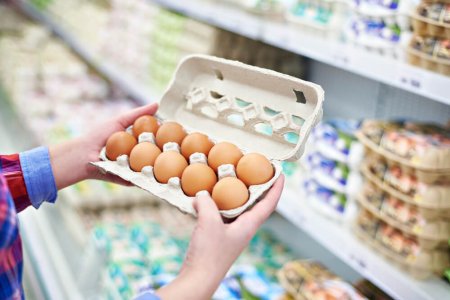Favourite everyday item to disappear from Woolworths. Find out why shoppers are divided
- Replies 70
There's nothing worse than going to grab your favourite grocery staple only to find out that it's no longer sold at your local Woolworths. So, for some folks, a recent decision made by the retail giant has left them a bit miffed, while others are praising the change.
Woolworths has announced that it will be phasing out the sale of all caged eggs across their stores by 2025 – a decision that has left shoppers sharply divided.
Remembering that this is the same supermarket that stopped selling its own brand of caged eggs back in 2015, Woolworths is stepping up its game by pledging to remove all caged eggs sold by other suppliers in the forthcoming years.
Although caged eggs are generally a cheaper option for consumers, many shoppers prefer to purchase barn-laid and free-range eggs due to their more ethical production process. Free-range production allows hens to roam outdoors, whereas caged hens are confined to small spaces in rows of wire cages. Many reports indicate that free-range eggs not only improve animal welfare but also often taste better and may even have a higher nutritional value due to the hens having a more diverse diet.
A Woolworths spokesperson shed some light on the situation: ‘Our own Woolworths-branded egg cartons have been 100 per cent cage-free since 2015. We announced our plans to transition our entire egg range to cage-free back in 2013, and we're working closely with our suppliers to gradually phase out caged eggs from all the brands we sell by 2025, we know many retailers and hospitality operators are moving in a similar direction.’
The spokesperson added: ‘We understand a change like this takes time, and that's why we've consulted with our suppliers to ensure they have sufficient time to make changes to their production methods.’
Not everyone is sunny-side-up about this decision, with one customer voicing their disapproval on Facebook: ‘So now Woolies are not gonna sell caged eggs well looks like hundreds of thousands of people will be going elsewhere for our eggs. Woolies is becoming way too expensive and political to support them anymore.’
However, others have praised the decision and shared their thoughts on social media. One satisfied customer said, ‘It's great to see Woolworths taking animal welfare seriously. I normally buy free-range eggs, and I'm glad the store is making it easier for others to do the same.’
It's worth noting that Woolworths is not removing barn-laid eggs from their shelves – only aiming for cage-free eggs, and no specific timeline or goal has been announced for switching over to 100 per cent free-range eggs. To clarify the terms: cage-free indicates that hens are not confined to cages but might still be housed indoors, whereas barn-laid and free-range hens have more space to move around and, in the case of free-range, access to outdoor areas.
Currently, the entry price for Woolworths cage-free (barn-laid) eggs is $4.60 per dozen, with caged eggs at $4.50 per dozen.
In fact, over the last six months, Woolworths has observed an increase in customer demand for eggs of all varieties, which will likely play a role in the continuation of this ongoing discussion.
If you're looking to ensure the freshness of eggs at home, remember to check the 'best before' date on the packaging, perform the 'float test' by placing the egg in a bowl of water (if it sinks, it's fresh; if it floats, it's likely gone bad), and always inspect the shells for any cracks or damage.

For our SDC members who prefer caged eggs for their budget, we recommend looking out for deals and specials on barn-laid or free-range eggs at your local store and maybe browsing local farmers' markets where you might find a better deal or an even fresher product.
We'd love to hear your thoughts on this decision – do you applaud the change, or will it have an impact on your weekly grocery expenses? Let's keep the conversation going!
Woolworths has announced that it will be phasing out the sale of all caged eggs across their stores by 2025 – a decision that has left shoppers sharply divided.
Remembering that this is the same supermarket that stopped selling its own brand of caged eggs back in 2015, Woolworths is stepping up its game by pledging to remove all caged eggs sold by other suppliers in the forthcoming years.
Although caged eggs are generally a cheaper option for consumers, many shoppers prefer to purchase barn-laid and free-range eggs due to their more ethical production process. Free-range production allows hens to roam outdoors, whereas caged hens are confined to small spaces in rows of wire cages. Many reports indicate that free-range eggs not only improve animal welfare but also often taste better and may even have a higher nutritional value due to the hens having a more diverse diet.
A Woolworths spokesperson shed some light on the situation: ‘Our own Woolworths-branded egg cartons have been 100 per cent cage-free since 2015. We announced our plans to transition our entire egg range to cage-free back in 2013, and we're working closely with our suppliers to gradually phase out caged eggs from all the brands we sell by 2025, we know many retailers and hospitality operators are moving in a similar direction.’
The spokesperson added: ‘We understand a change like this takes time, and that's why we've consulted with our suppliers to ensure they have sufficient time to make changes to their production methods.’
Not everyone is sunny-side-up about this decision, with one customer voicing their disapproval on Facebook: ‘So now Woolies are not gonna sell caged eggs well looks like hundreds of thousands of people will be going elsewhere for our eggs. Woolies is becoming way too expensive and political to support them anymore.’
However, others have praised the decision and shared their thoughts on social media. One satisfied customer said, ‘It's great to see Woolworths taking animal welfare seriously. I normally buy free-range eggs, and I'm glad the store is making it easier for others to do the same.’
It's worth noting that Woolworths is not removing barn-laid eggs from their shelves – only aiming for cage-free eggs, and no specific timeline or goal has been announced for switching over to 100 per cent free-range eggs. To clarify the terms: cage-free indicates that hens are not confined to cages but might still be housed indoors, whereas barn-laid and free-range hens have more space to move around and, in the case of free-range, access to outdoor areas.
Currently, the entry price for Woolworths cage-free (barn-laid) eggs is $4.60 per dozen, with caged eggs at $4.50 per dozen.
In fact, over the last six months, Woolworths has observed an increase in customer demand for eggs of all varieties, which will likely play a role in the continuation of this ongoing discussion.
If you're looking to ensure the freshness of eggs at home, remember to check the 'best before' date on the packaging, perform the 'float test' by placing the egg in a bowl of water (if it sinks, it's fresh; if it floats, it's likely gone bad), and always inspect the shells for any cracks or damage.
Key Takeaways
- Woolworths supermarket has confirmed that it will no longer sell caged eggs, phasing them out from all stores by 2025.
- The retail giant will remove caged eggs sold by other suppliers by 2025 after having stopped selling its own brand of caged eggs in 2015.
- Many shoppers prefer to buy barn-laid and free-range eggs due to ethical concerns, but some are unhappy with the decision, claiming Woolworths is becoming too expensive and political.
- Woolworths has not set a goal or timeline to achieve 100 per cent free-range eggs; their goal relates to cage-free eggs, meaning barn-laid eggs will not be phased out, only caged eggs.
For our SDC members who prefer caged eggs for their budget, we recommend looking out for deals and specials on barn-laid or free-range eggs at your local store and maybe browsing local farmers' markets where you might find a better deal or an even fresher product.
We'd love to hear your thoughts on this decision – do you applaud the change, or will it have an impact on your weekly grocery expenses? Let's keep the conversation going!








